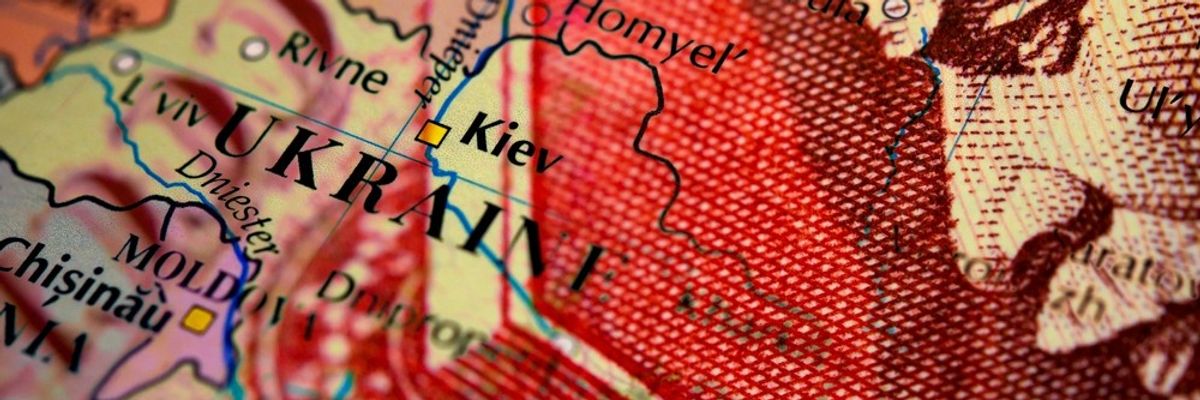Over the weekend, Western nations sharply escalated their economic pressure on Moscow as the United States, the European Union, and other allied countries, notably Japan and Canada, sanctioned Russia’s central bank. This blocked Russia’s access to some two-thirds of its nearly $600 billion worth of gold and foreign exchange reserves, or about $400 billion. That’s the total amount that was held electronically in foreign accounts of banks in the U.S. and allied countries.
It was a remarkable demonstration of the power of financial sanctions in the era of globalized digital finance. With a few conference calls and the click of a button, the U.S.-led coalition seized hundreds of billions of dollars worth of critical assets from a rival country that had violated international law, assets that the Kremlin had counted on to make its economy “sanctions-proof.” Without access to these reserves to support the ruble, the value of the currency dropped by 30 percent, and has fallen by nearly 40 percent since the crisis began. As a result, the Russian central bank doubled interest rates to 20 percent to combat the soaring inflation that will result from the decline in the value of the ruble, which greatly increases import prices.
There’s no doubt that these measures will deal a devastating blow to the Russian economy, almost certainly triggering its worst contraction in decades. If the possibility of lifting sanctions were linked to clear diplomatic goals, they could create a powerful incentive for Moscow to reach a peace settlement and boost the negotiating leverage of the Ukrainian government in talks.
But the use of this nuclear sanctions option also carries costs and risks. That’s particularly true if sanctions are open-ended and long term, aimed at provoking regime change in Russia rather than linked to a diplomatic process to end the war in Ukraine.
First, by causing a general economic collapse, central bank sanctions will have a devastating impact on ordinary Russian civilians, as opposed to being targeted on the decision makers and powerful cronies around Putin. Indeed, because of their wealth and power, those closest to Putin will be least vulnerable to a generalized economic collapse. The assumption is that broad popular discontent will force an end to the war or even the overthrow of Putin. But the assumption that severe sanctions will lead to regime change has not held true in much less powerful countries, such as Cuba, Syria, Venezuela, or Iran. Instead, the regimes in those countries have remained in power even as their citizens have struggled with poverty, fed by decades of sanctions.
Second, sanctions of this severity, especially if not linked to a diplomatic process for reaching a peace agreement, can risk fueling further escalation of the conflict. The U.S. has never levied sanctions of this intensity on a nuclear power. An open-ended declaration of economic war could have unpredictable long-term consequences, inviting serious retaliation, either economically through cyber warfare or more conventional military action. It also risks fostering internal disorder in a nuclear superpower.
Third, there is the possibility of economic spillover to the U.S. Sales of Russian energy commodities are exempted from the most severe financial sanctions, but the increasing intensity of general sanctions on the Russian financial system is causing energy buyers to substitute away from Russia energy and instead purchase from other sources. While this serves to increase pressure on the Russian economy, it also increases the price of other sources of oil, including those that account for the majority of U.S. imports. Cecilia Rouse, chair of Biden’s Council of Economic Advisers, stated yesterday that rising energy prices linked to the Ukraine war pose a significant risk to the U.S. economy, one that grows as the war continues.
Finally, the demonstration of the financial power of the U.S. and its allies to seize the assets of a rival nation will greatly increase incentives for creating alternatives to the dollar-centered global financial system. The announcement of the sanctions has already had this effect, but the longer they are sustained and the less clearly they are linked to quickly and directly reversing an illegal aggressive war, the more momentum such alternatives will gain. Alternatives will likely center on China’s CIPS system and serve to increase Beijing’s financial clout. Critical advantages that the U.S. gains through dollar hegemony, most notably the ability to borrow internationally at low interest rates, may erode.
Central bank sanctions at this scale are unprecedented in their power and scope, but also in the risks they could pose — from hardship for innocent civilians, to the very real danger of military escalation. These risks will be minimized — and incentives for reaching a diplomatic settlement in Ukraine optimized – if conditions for lifting the sanctions are made clear and linked to success in achieving a negotiated settlement.














